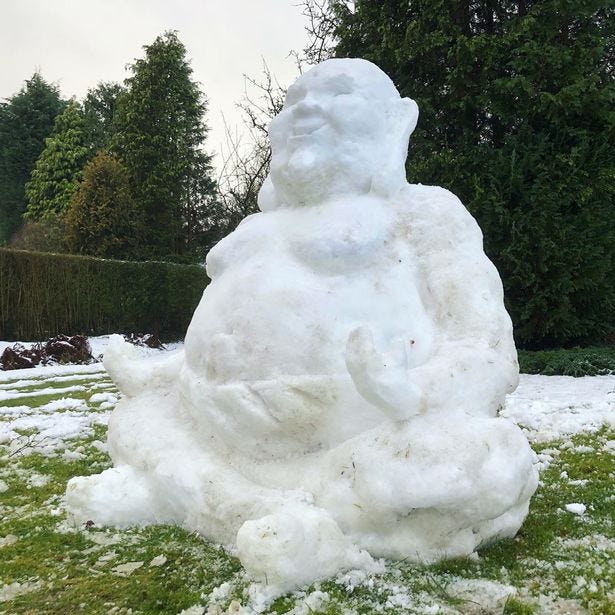In Conversation with the Snowman
and Wallace Stevens, Terrance Hayes and James Baldwin
Saturday, January 14, 2023
My sleep is fitful, my wakefulness disturbed. Images of a slave ship off the coast of Ghana, white sails filled, an enormous pair of blue eyes painted on the hull, men and women and children chained to the deck pair with thoughts about dinner and what TV show to watch this evening. My readings on the history of the foundation of this country have cracked open America’s terrible secrets about how we became “great.” Fragments of that history lie scattered around me like broken pieces of furniture and shards of glass. I trip over them, wish I could sweep them away and rearrange my mind in its old, innocent form.
I love snow, and all the forms
Of the radiant frost;
I love waves, and winds, and storms,
Everything almost
Which is Nature’s, and may be
Untainted by man’s misery. Percy Bysshe Shelly, I wake longing for the relief that comes from a nor’easter, but our warming planet offers nothing of that radiant frost, that sustenance of Nature, untainted by man’s misery. There is only cold rain for which the word dismal is best chosen. The rain has washed away all the snowmen and our long, rutted, muddy driveway is anything but mudluscious.
“I need a mind of winter,” I think as I make coffee in the dark of the morning, “and I know just how to find it.” I don’t wait to find my copy of the collected poems of Wallace Stevens lying somewhere on a shelf in the basement, instead I google, “The Snow Man” and there it is, the poem I hope will bring some relief from this feeling of being torn apart by the horror of what history has revealed of my country and all the aspirations and beliefs I carry within me.
The Snow Man
One must have a mind of winter
To regard the frost and the boughs
Of the pine-trees crusted with snow;
And have been cold a long time
To behold the junipers shagged with ice,
The spruces rough in the distant glitter
Of the January sun; and not to think
Of any misery in the sound of the wind,
In the sound of a few leaves,
Which is the sound of the land
Full of the same wind
That is blowing in the same bare place
For the listener, who listens in the snow,
And, nothing himself, beholds
Nothing that is not there and the nothing that is.I’ve never associated snowstorms with misery, instead these atmospheric dervishes sweep me into their tumult, alter the shape and texture of ordinary life as I and the junipers shagged with ice are transformed into a vast expansiveness of air and crystals, devoid of all form and color, newly softened, reborn into the nothing that is. This is the snowman self I wish for now, and which, for a few moments while Stevens dazzles me with his words, I am.
But my time as the snowman beholding the radiant nothingness of being is short-lived. For, while googling “The Snowman” on the great world wide web, I found, to my surprise, this poem, “Snow for Wallace Stevens,” written by Terrance Hayes, a Black poet, now 51 years old, winner of the National Book Award for Poetry and a MacArthur fellow.
Snow For Wallace Stevens
No one living a snowed-in life
can sleep without a blindfold.
Light is the lion that comes down to drink.
I know tink and tank and tunk-a-tunk-tunk
holds nearly the same sound as a bottle.
Drink and drank and drunk-a-drunk-drunk,
Light is the lion that comes down.
This song is for the wise man who avenges
by building his city in snow.
I know what he said in his poem.
“Decorations in a Nigger Cemetery.”
How, with pipes of winter
lining his cognition, does someone learn
to bring a sentence to its knees?
Who is not more than his limitations,
who is not the blood in a wine barrel
and the wine as well? I too, having lost faith
in language have placed my faith in language.
Thus, I have a capacity for love without
forgiveness. This song is for my foe,
the clean shaven, gray-suited, gray patron
of Hartford, the emperor of whiteness
blue as a body made of snow.
I know Terrance. He had not yet written this poem when I met him. He was the first mentor assigned to me when I began my MFA program at Stonecoast, the University of Southern Maine’s creative writing program. We worked together for six months. He was barely thirty-five, and I was just past sixty and had behind me less than a year’s worth of writing anything at all besides the process notes and case records of my profession.
My explicit purpose in getting an MFA was to rescue myself from oblivion. Forty years of doing psychotherapy as a “blank screen” had robbed me of language for my own inner self. I had become the blank screen.
Terrance had not yet written the searing poems about racism that he is known for now, so I had little insight into his experiences which would lead him to write these lines taken from a sonnet from his book, “American Sonnets for my Past and Future Assassins:” When the wound is deep, the healing is heroic. Suffering and ascendance require the same work.
I was that person he points to living a snowed-in life, blindfolded against the truths of his life, his family’s life, our country’s. When we sat across from each other and talked about what makes a poem, he was enormously kind; he helped give life to my dry, minced language. My poems were the ordinary poems of a prosperous white woman: poems about my mother or worries for my children and he opened himself to all of them. But what of the blindfold I wore, the way in which, blinded by the history I was taught, I never opened myself to the world that shaped him?
How, with pipes of winter lining his cognition, does someone learn to bring a sentence to its knees?
Of course, Terrance and I never spoke about these pipes of winter that rumbled silently between us. In the essay, “Unnamable Objects, Unspeakable Crimes” James Baldwin says, “the black man can scarcely dare to open a dialogue [with the white man which must, if it is honest, become a personal confession which, fatally, contains an accusation.” In the poem, Hayes confesses his own poetic blues and at the same time accuses Stevens of having a mind clouded by racism.
Baldwin goes on to say..“the white man can scarcely dare to open a dialogue which must, if it is honest, become a personal confession—a cry for help and healing, which is really, I think, the basis of all dialogues.”
What if Terrance and I were to sit across from each other now and I would dare to open that dialogue, that personal confession, that cry for help and healing, healing which is heroic? What would happen to my language, to my agitation and horror? Perhaps together we could examine words we no longer trust, words like freedom and justice for all. And perhaps we could arrive, finally, at that one word which carries the capacity to save us: thus I have a capacity for love without forgiveness.
Nothing about our history of slavery or our genocide of Native Americans can be forgiven. But, to quote Baldwin, if the white man reads history and:
enters into battle with that historical creation, oneself, and attempts to recreate oneself according to a principle more humane and more liberating, one begins the attempt to achieve a level of personal maturity and freedom which robs history of its tyrannical power, and also changes history.
It is afternoon now, the temperature is 35 degrees. No snowman came to rescue me from the horror of the truths of history, nothing absolved me from the litter on the floor, but these conversations with Terrance Hayes and James Baldwin have brought me out of my fitful state and reminded me, again, of the power of that one word: love.
Tomorrow is Martin Luther King Day, a holiday in his honor and a day for reflection. Here again is the link to Baldwin’s essay “Unnameable Objects, Unspeakable Crimes,” which I quote from above. I urge you to read it.





The Half-Finished Heaven
Despondency breaks off its course.
Anguish breaks off its course.
The vulture breaks off its flight.
The eager light streams out,
even the ghosts take a draught.
And our paintings see daylight,
our red beasts of the ice-age studios.
Everything begins to look around.
We walk in the sun in hundreds.
Each man is a half-open door
leading to a room for everyone.
The endless ground under us.
The water is shining among the trees
-Transtromer
Oh great poem to add here, Michael. Thanks.